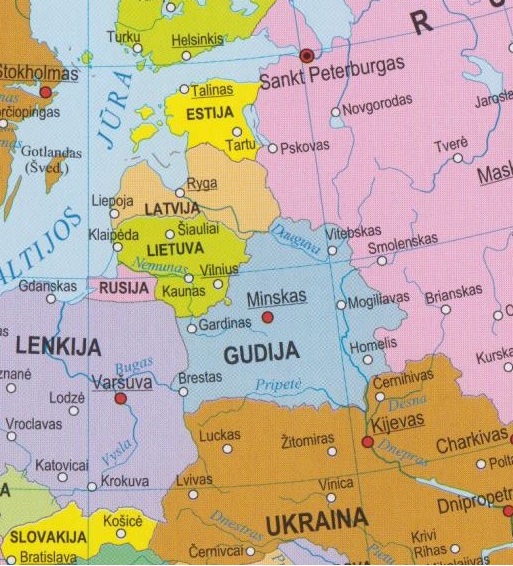The leader of the Belarusian opposition disapproves of the Lithuanian name of Belarus

After the government crisis in Estonia, the second most internationally significant event in the Baltics was the proposal of the Lithuanian Minister of Foreign Affairs Gabrielius Landsbergis to the State Commission of the Lithuanian Language to evaluate the possibility of giving up the traditional Belarusian state name in Lithuanian.
This week, the leader of the Belarusian opposition, Sviatlana Tsikhanouskaya, who has been granted asylum in Lithuania, addressed the Lithuanian Minister of Foreign Affairs with a call to change the traditional name of Belarus in the Lithuanian language to another form closer to the Belarusian state. If Lithuanians renounced their traditional name of Belarus, such a decision "would show respect for the sovereignty of its neighbor and would support the linguistic and cultural identity of the Belarusian people."
This request was immediately supported by the Lithuanian Minister of Foreign Affairs, while the State Commission of the Lithuanian Language has so far been wary of such a proposal.
It may be recalled that in Belarusian their name is "Belarus", while in Lithuanian the name of Belarus is "Gudija".
It is not strange for the name of Belarus in Lithuanian to differ from the name of the country and land used by Belarusians themselves. In all the languages of the Baltic nations, the names of the neighboring Slavic lands were created based on very historical and ancient designations of the respective lands. In Russian, their country's name is "Rossiya". The word "Krievija" is used in Latvian. To the east of the Latvian lands lived the East Slavic Kriviči tribe, and for a long time, the lands to the east of the Latvian lands have been called kriviči lands, which eventually became the name of Krievija.
It is a tradition that is rooted in the Latvian language, culture, education, and everyday lexicon. Therefore, when creating the name of the state of Belarus, Latvians also did not use the form "Belarus" but used the local name of Russia (Baltkrievija - White Russia). The same is true in Estonian. In Estonian, Russia is "Venemaa" and Belarus is "Valgevene (White Vene)".
In Lithuanian too, the neighboring Slavic lands are called based on traditional land names. Until the end of the Second World War, Lithuanian-inhabited lands had no direct borders with modern-day Russia. The lands inhabited by Lithuanians bordered only the lands inhabited by Poles and Belarusians. Thus, in Lithuanian, Poland is "Lenkija", but Belarus is "Gudija".
The historical names are still used to denote Germany in the Baltic States. In none of the languages of the Baltic nations is Germany called "Deutschland". Latvians use the form "Vācija", Estonians "Saksamaa" (probably from Saxony), and Lithuanians - "Vokietija".
Currently, the Baltic States are helping the Belarusian people to stand on the path to democracy in solidarity. Lithuania has hosted the leader of the Belarusian opposition, provides support for protest movements in Belarus, and so on. But hospitality does not mean that the guest can begin to dictate how we should live and that we should abandon our traditions in language, geography, history, and culture in order to indulge the guest.
The demand of the Belarusian opposition to change the name of Belarus in the Lithuanian language is a rude audacity and disrespect for a country that provides support and refuge to Belarusian freedom fighters.
The Belarusian opposition must be tactfully taught that imposing its whims on other nations is more reminiscent of Soviet-era Great Russian chauvinism. If Belarusian opposition leaders really want to move towards democracy, they must immediately learn to respect the culture, traditions, and values of other nations.
